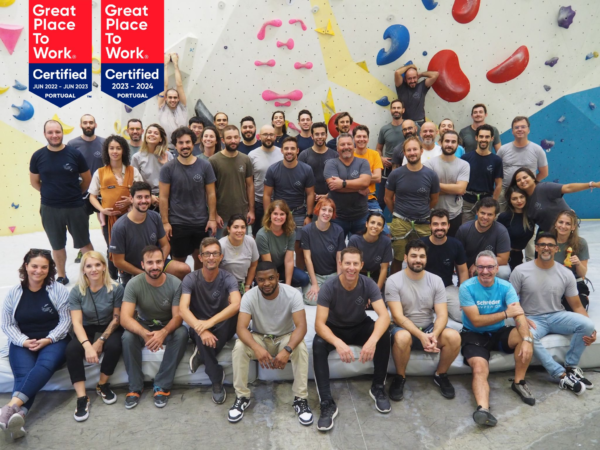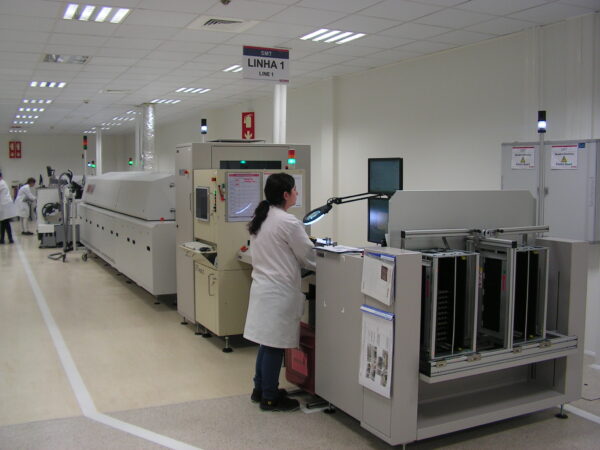
Brought to you by AICEP – Portuguese Trade & Investment Agency
Unlocking global opportunities
January 31, 2024 in Exporting & Importing Manufacturing
Spotlight on Portugal as a premier investment hub for manufacturers seeking growth.
When Belgian-based smart lighting producer Schréder began investing in Portugal back in 1956, the value proposition was clear. Labour costs were part of the competitive advantages, and Portugal had strong ties with Africa (Angola, Mozambique, Guinea, the Cape Verde Islands and Sao Tome and Principe), making it a good base for exporting.

Schréder, a family-run business based in Belgium, operates two factories employing 200 people in the Lisbon metropolitan area. Photo courtesy of Schréder.
Some 70 years later, family-run Schréder continues to operate two factories employing 200 people in the Lisbon metropolitan area. And in 2019, the company launched its brand-new Hyperion innovation hub on the Nova Business School University campus in Southern Portugal, which has grown from 10 to 95 people.
If anything, Portugal offers an even more compelling rationale for investment than it did in the past, says Tomás Almeida, Schréder’s manager of institutional relations and corporate affairs. The academics and professional training of the Portuguese work force and its competitiveness and multilingual skills are key factors for investment. “And it has good physical and IT infrastructure, a stable government, a low crime rate and strong ties with European, African and South American countries, in particular Brazil,” Almeida adds.
He’s not alone in regarding Portugal as a good place to do business. Filipe Santos Costa, chairman and CEO of AICEP – Portuguese Trade & Investment Agency, says 2023 marked another record year for value-added productive projects coming into Portugal from foreign investors.

Filipe Santos Costa, chairman and CEO of AICEP – Portuguese Trade & Investment Agency.
“The upward trajectory of foreign direct investment into Portugal is driven by many factors, from the quality of its institutions to the streamlined global logistics, both seaward and to the European hinterland,” Costa says. “And we also have increased availability of internet and green electricity; a strategic location, and a welcoming attitude to foreign investment and foreigners in general.”
A gateway to the EU and the rest of the world
For U.S. and Canadian firms seeking to establish a foothold in the EU market, Portugal makes a particularly good entry point or test market, Costa points out. Although the Portuguese market on its own is relatively small, consisting of just 10.3 million people, more than 250 million people speak Portuguese worldwide.
Perhaps even more important, says Almeida, as an EU member, “Portugal’s borders and ports are completely open to the free flow of trade with other EU member countries.” It has also maintained strong ties to the United Kingdom in spite of Brexit. “Portugal has one of the oldest treaties in the world with the U.K., dating back to the 1300s,” Almeida says. “When the U.K. left the European Union, Portugal was immediately the country attention turned to when it came to maintaining links with the Anglo-Saxon-speaking world.”
The country’s infrastructure is well able to sustain its multiple ties with the EU, the U.K. and other parts of the world. When Portugal became a member of the EU in 1986, it began a massive overhaul of its infrastructure. Not only does the country have a well-developed road system, but its ports have become cause for celebration.
That’s a significant advantage for manufacturing plants that often have to import parts and materials and export product. Luís Lisboa, finance manager for Continental Advanced Antenna (CAA) in Vila Real, Portugal, imports micro-chips and small parts from Asia, for example, in order to manufacture automotive antennas. “We have two big ports, one in the Lisbon area and one nearby in Porto that can manage the containers very easily,” he says. On the other end of the process, he’s able to take advantage of Portugal’s excellent road connections to Germany (where 60 per cent of his product goes) and the rest of Europe.
All in all, Portugal has 40 seaports and river ports serving as vital trade routes for the Mediterranean Sea, Atlantic Ocean and Suez Canal. The port at Sines ranks as one of the largest deep water ports in the world, and it gives the country excellent access to gas, oil and carbon, adds Almeida, which will increasingly be a benefit in the face of the energy crisis caused by Russia’s war in the Ukraine.
What’s more, Portugal’s investment in infrastructure is ongoing. In 2023 alone it spent a hefty €1.09 billion on rail and public transport, and it is slated to increase that investment by 23 per cent in 2024 to €1.34 billion.
Accessible, skilled and loyal personnel
A skilled workforce is the lifeblood of almost any manufacturing enterprise. And for Lisboa, one of the most compelling reasons to locate a manufacturing plant in Portugal is the ready availability of dedicated blue-collar workers who tend to stick with their employers, often for decades.

Continental Advanced Antenna (CAA) employs many long-term staff in the interior of Portugal. Photo courtesy of CAA.
CAA employs 398 labourers, he says, so the plant was deliberately located in the interior of the country where tourism and other jobs aren’t readily available. “In the interior, workers usually go to a company and they see that as a job for life,” says Lisboa. “There are a lot of [people] at my plant who have been 35 years in the company.”
That cohort of long-term employees ensures “the continuity of knowledge, values and commitment to the next generation of workers,” he points out. “And we never have to stop production because we don’t have employees.”
White-collar workers, including plenty of engineers, are readily available too, Costa adds. “We have had noticeable yearly achievements in the national output of talent,” he says, “including excellent results in STEM, particularly in engineering (third-highest rate of engineering graduates in Europe), medical sciences, business administration and, of course, foreign language skills.”
And whether you’re planning to hire from within Portugal or from European or North American countries, Almeida adds, the fact that Portugal is a sunbelt country is a significant draw. “Lifestyle is a factor,” he says. The country’s vibrant cities, beautiful beaches, fresh seafood and Mediterranean charm ensure it has no problem attracting talent from further afield.
Tax incentives for individuals and businesses
Companies opting to locate in Portugal can take advantage of a variety of incentives, including: a reduced corporate income tax if they’re engaged in export activities; exemption from withholding tax on dividends, interest, and royalties paid to non-residents; and tax deductions for investment in certain regions of Portugal, such as the Autonomous Region of Madeira and the Azores.
Those incentives are one of the fundamental reasons for investing in Portugal, contends Lisboa. “Just to give you an example, you can have a machine 50 per cent financed by these programs. So if you put in a production line that costs €1 million, the cost to you is just €500,000. And the incentives are even better if you’re starting up a business here and making a significant investment. They may even support a percentage of the payroll.”
There are also tax incentives for research and development, intellectual property (IP) and innovation, combined with additional financial incentives from the European Union. “Aside from the Lisbon metropolitan area, the other regions of the country are not in line with the average European Union levels,” Almeida explains. “So they attract more financial incentives.”
Manufacturers seeking help with navigating the various incentives and tax breaks (or the Portuguese market in general) will find a useful ally in AICEP. “In addition to providing advice and tailored information, AICEP monitors all stages of the projects – from analysis and investment incentives to site installation selection and human resources consultancy,” Costa says.
Ultimately, he adds, “We welcome all investment projects in Portugal that contribute to the competitiveness and sustainable growth of the Portuguese economy.”
For more information, please visit PortugalGlobal.pt
Created by Amplify by Annex, in partnership with AICEP – Portuguese Trade & Investment Agency and Canadian Manufacturing.
Advertisement
- Protecting Manufacturing Businesses from Cyber Threats
- NSF Guelph Food Lab helps manufacturers develop and launch new products